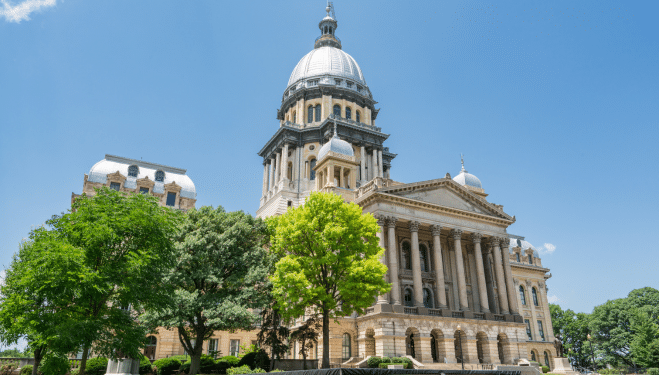Legislation that will require pro-life pregnancy centers to provide abortion information to their clients has passed the Illinois General Assembly and awaits the governor’s signature. Senate Bill 1909, titled the “Deceptive Practices of Limited Services Pregnancy Centers Act,” passed the Illinois House May 10 with a vote along party lines. The new law will impose fines of up to $50,000 on centers opposed to abortion that do not to provide pregnant women with information on the procedure, and for providing what abortion advocates deem as “deceptive” information.
“We’re sad that it passed but it’s not over yet,” said Molly Malone, assistant legislative chair of Illinois Right to Life (IRL). “Legislators who voted for this put the interests of the abortion industry over those of women. They took away choices from women, primarily from poor women who would not want abortions if they knew the resources that were available to them.”
Kevin Carrothers called the bill’s passage “disheartening in regard to the biblical view on the sanctity of life.” The Executive Director of the Baptist Children’s Home and Family Services (BCHFS) reiterated the ministry’s commitment to “providing Christ-centered services that protect the life of the child in the womb and the welfare of the mother.” BCHFS operates GraceHaven Pregnancy Resource Clinic in Mt. Vernon and assists women facing crisis pregnancies through Angel’s Cove residential maternity home.
The bill passed the House on a partisan vote, with 72 Democrats voting for the bill, one against it, and another voting present; all 40 Republicans voted against it. The March 31 Senate vote fell along similar party lines.
The new law that brands life-saving ministry as “deceptive” is referred to as the “forced abortion information act” by pro-life advocates. They say the legislation does not clearly define what deceptive information is or who would make that determination. They also say it unfairly targets religious speech in violation of the First and Fourteenth amendments of the U.S. Constitution, because many centers are operated by religious organizations or charities.
Malone told the Illinois Baptist the legislation takes choices away from women. “Especially in Illinois, some of these women don’t know that there is this choice—that there are people who will help them with ultrasounds, parenting classes, and adoption agencies.” Pregnancy centers also provide post-abortion counseling for women who chose to terminate a pregnancy, Malone said. “Planned Parenthood doesn’t do that.”
There are about 100 pregnancy resource centers in Illinois, according to IRL.
“These Christ-centered services [they offer] include discussing God’s view about life and creation, praying with clients, sharing the good news of Jesus,” Carrothers said. They also help women understand the reality of their unborn child by “providing information about what happens to an infant during both a chemical and procedural abortion, and by offering ultrasounds showing the infant and heartbeat.”
Illinoisans showed overwhelming opposition to the “deceptive” bill during the General Assembly hearings. Over 17,000 pro-life advocates registered legislative witness slips in opposition of before the House vote, versus roughly 3,000 in support. In the Senate, almost 9,000 witness slips opposed the bill, compared to some 2,700 in support.
The governor has indicated his willingness to sign the bill, which will take effect as soon as he does. However, opponents are expected to file an injection to stop it. The U.S. Supreme Court overturned a similar bill in California in 2018, declaring in NIFLA v. Becerra that the measure unfairly targeted pregnancy centers.
“We will continue to monitor the progress of this law and its impact on pregnancy resource centers,” Carrothers said.

